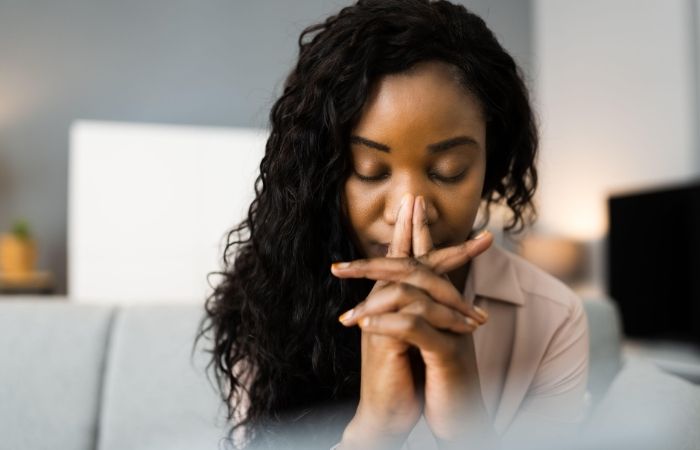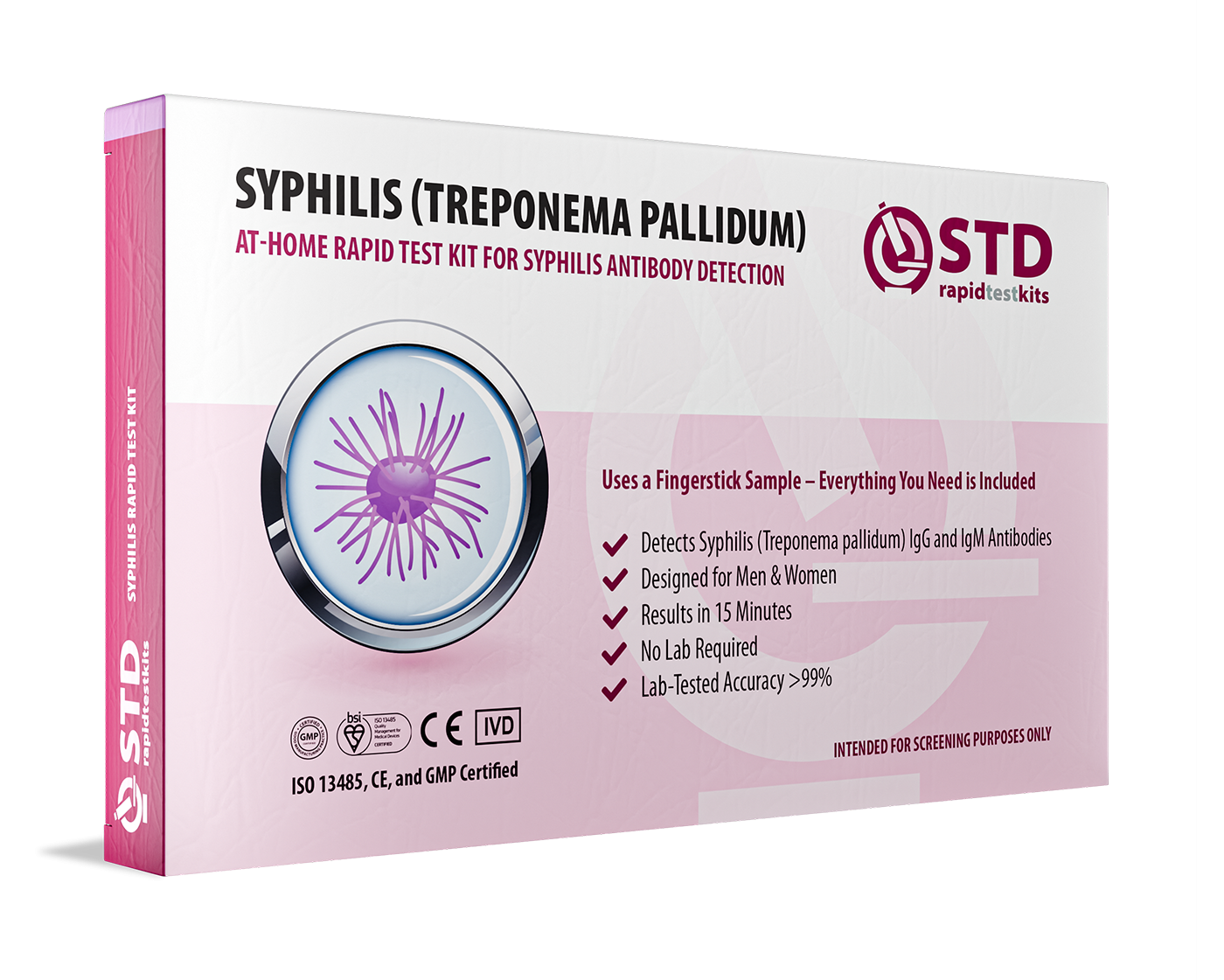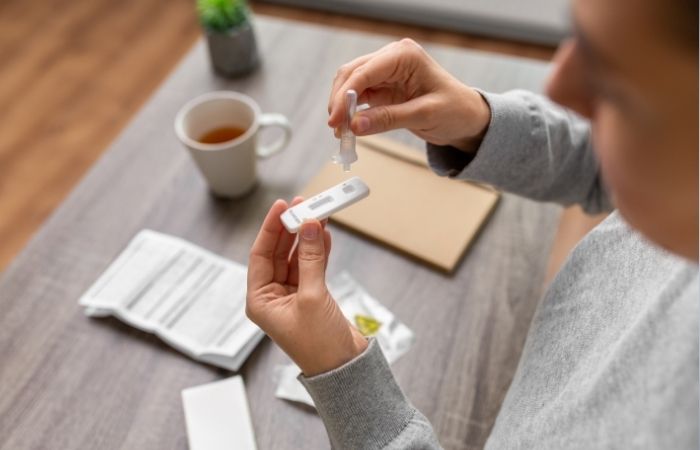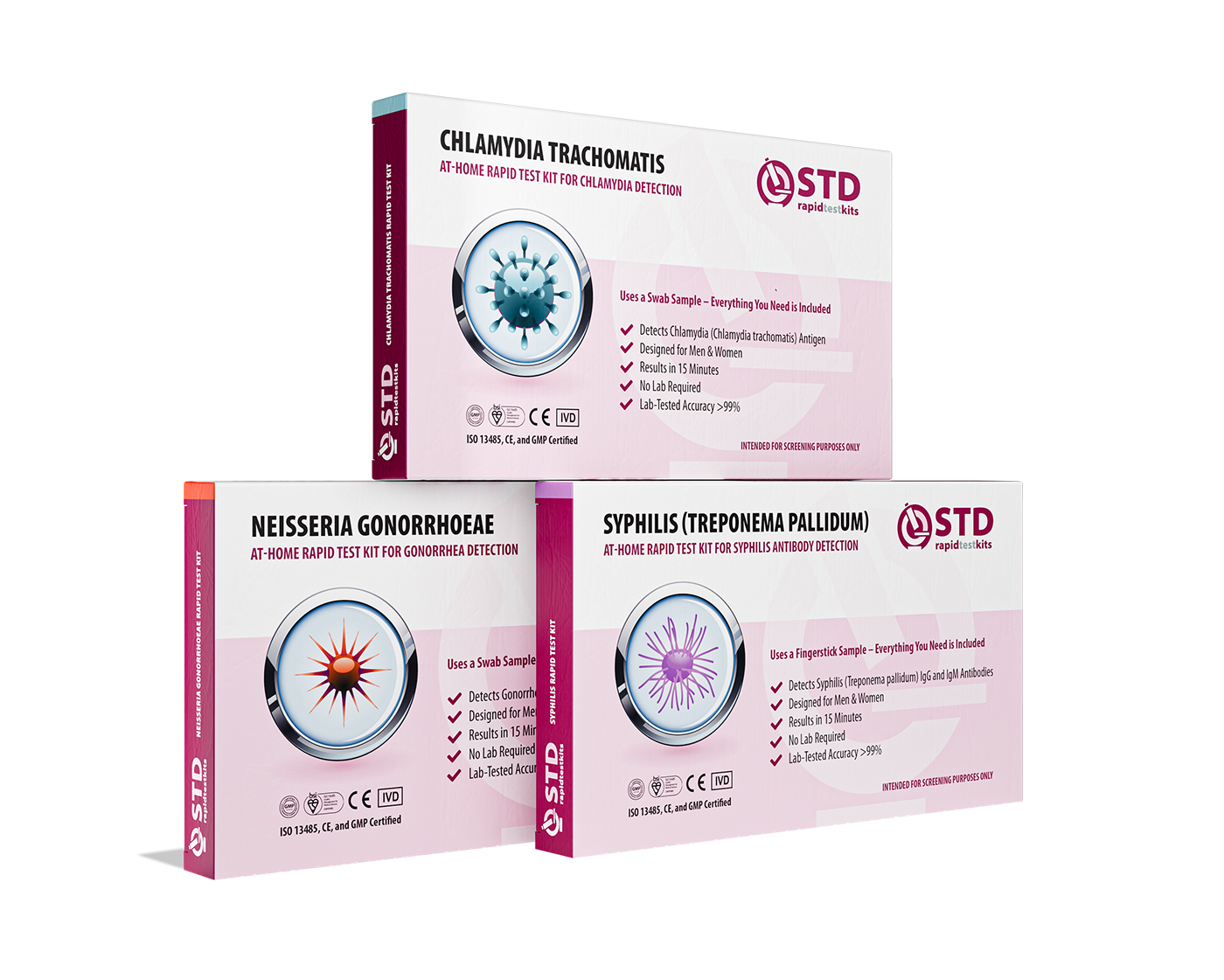Quick Answer: Louisiana is facing a sharp rise in gonorrhea and syphilis. At‑home STD tests offer a fast, private way to detect infections early without waiting in a crowded clinic.
Louisiana’s STD rates are climbing at a pace that has public health officials sounding alarms. In the latest CDC report, the state ranked near the top for both gonorrhea and syphilis infections, with urban centers like New Orleans and Baton Rouge reporting sharp spikes. Rural parishes aren’t spared either. When infections rise, so does the anxiety, especially for people who don’t have the time, transportation, or privacy for traditional clinic visits.
But this story isn’t just about numbers. It’s about people like Jasmine, whose lives keep moving even when fear creeps in. It’s the construction worker in Shreveport who notices a sore but can’t risk missing a shift. It’s the college student at LSU who quietly worries after a weekend hookup, refreshing Google instead of booking an appointment. And it’s the single mother in Lafayette who wonders if she’ll find childcare long enough to get a test done before the clinic closes.

People are also looking for: I Shared a Vape at a Party, Do I Need an STD Test?
When Waiting Rooms Become a Barrier
In Louisiana, sexual health often collides with daily survival. Clinics in New Orleans or Baton Rouge might offer same‑day testing, but they’re often packed. A quick visit can turn into a half‑day commitment, and for many, that lost time means lost wages. Rural residents face a different challenge: some parishes have no dedicated STD clinic at all. A 90‑minute drive each way can make “just to be safe” testing feel impossible.
Marcus, 34, from a small town outside Lake Charles, remembers his breaking point.
“I knew something was of, but by the time I got off work, the clinic was closed. By the weekend, I was too embarrassed to explain why I needed a day off.”
He finally ordered a home STD kit online after seeing a news story about rising gonorrhea rates in the state. The result came in 15 minutes: positive. It was the wake‑up call he needed, but also a relief. He had an answer, and a plan, without the heavy wait and side‑eye in a clinic lobby.
This is the quiet reality driving the shift to at‑home testing. People are not reckless, they are busy, anxious, and sometimes scared of being seen. Home STD kits fill a gap that traditional healthcare can’t always reach, especially in states like Louisiana where transportation and stigma form invisible walls around testing.
The Emotional Weight of “What If?”
STD anxiety rarely looks like a screaming siren. It’s subtle, creeping into your thoughts at night or during a shower. One twinge of discomfort, one spot you overanalyze, and suddenly you’re in a spiral. Many Louisiana residents quietly carry that weight for days or weeks before seeking help. It’s not always denial, it’s logistics, shame, and the exhausting question of “what will people think?”
When home testing enters the story, the dynamic changes. It turns a looming fear into a small, actionable step. Imagine dim kitchen light in Baton Rouge, a package discreetly opened, a timer ticking down while someone paces and scrolls through their phone. That 15 minutes is heavy, but it’s private. And when the result is negative, the relief floods in. When it’s positive, there’s fear, yes, but also a clear next step instead of endless guessing.
Check Your STD Status in Minutes
Test at Home with RemediumSyphilis Test Kit

 For Men & Women
For Men & Women Results in Minutes
Results in Minutes No Lab Needed
No Lab Needed Private & Discreet
Private & DiscreetOrder Now $33.99 $49.00
Louisiana’s Rising STD Wave: More Than a Statistic
Drive along I‑10 from New Orleans to Lafayette, and the billboards still mostly talk about gumbo festivals and car dealerships. What you won’t see are warnings about the surge in gonorrhea and syphilis that public health officials track with growing concern. Louisiana has climbed the ranks in the CDC’s STD surveillance reports, with cases rising in both the biggest cities and the quietest parishes. Behind every new number is a story: a hookup that felt harmless, a partner who didn’t know they were infected, a missed test that turned into a bigger problem.
Devon, 22, from Baton Rouge, remembers refreshing his email every few minutes after finally scheduling a clinic test. “They told me the results might take a few days,” he says. “I didn’t sleep that first night. I just kept imagining the worst.” When his result came back positive for gonorrhea, the relief was strange. It wasn’t good news, but it was something he could act on. “I just wished I could’ve known sooner,” he adds, shaking his head. The lag between worry and action is exactly where STDs thrive, and why Louisiana’s numbers keep climbing.
For public health workers, the concern isn’t only the raw case counts. It’s the cycle of silent transmission. Gonorrhea can hide without symptoms. Syphilis can masquerade as something minor or disappear into its early stages. By the time someone makes it to a clinic, they might have unknowingly passed it on. In a state where access to timely testing is uneven, infections can move faster than the system can catch them.
Why At‑Home Testing Makes Sense Here
In Louisiana, barriers to clinic-based testing stack up like Mardi Gras beads in a drawer. Distance, work schedules, lack of childcare, and the quiet pressure of stigma all nudge people toward waiting “just a little longer.” But waiting is exactly how STDs spread. At‑home testing offers an alternative that fits the real lives of people who can’t, or won’t, spend hours in a waiting room.
Mark, 31, from a small parish near Alexandria, recalls the first time she tried an at‑home kit.“I felt silly at first, like I was doing a science experiment in my house,” he laughs. “But when I saw the result in fifteen minutes, I felt this wave of calm. I didn’t have to drive an hour or explain to anyone why I needed a test.” That privacy, speed, and control are the quiet superpowers of home testing. It’s not just convenient, it breaks the chain of delay that allows gonorrhea and syphilis to linger in communities like his.
Public health experts now encourage blending clinic care with home solutions, especially in high‑incidence states. A single negative test at home can restore peace of mind. A positive test can fast‑track someone to treatment before the infection spreads. In both cases, the impact ripples outward, protecting not only the individual but the wider community that carries the weight of Louisiana’s rising STD rates.

People are also reading: Private, Fast, and 92% Accurate? At-Home STD Tests Explained
Testing at Home: Turning Fear into Action
Lorenzo, 28, and his girlfriend Maya, 24, live in a shotgun house just outside of New Orleans. They’d been together a few months when news alerts about Louisiana’s rising gonorrhea and syphilis rates started popping up on their phones. One evening, after dinner, Maya hesitated in the doorway of the living room and said, “Maybe we should just test, just to be sure.” Lorenzo laughed nervously at first, but a week later a small package arrived on their porch.
They turned the kitchen counter into their testing station, carefully reading the instructions. The hum of the refrigerator filled the silence as they waited for the timer to run. Lorenzo admitted he was sweating more from nerves than from the Louisiana heat. When their results came back negative, the relief was more than just medical, it was emotional. “It felt like we’d done something grown-up for our relationship,” he said. “Like we took care of each other.” For couples across Louisiana, at‑home testing has become more than a safety net, it’s a shared ritual of trust and responsibility.
From Private Relief to Public Impact
Every home test taken in Louisiana is a quiet act of public health. When someone discovers an infection at home and seeks treatment quickly, it stops a chain reaction that could have touched multiple lives. Public health officials say it’s the delays, not the diagnoses, that let Louisiana’s numbers climb so quickly. Home testing compresses the timeline: worry today, answer tonight, treatment tomorrow. In a state where clinic waits and travel distances have long worked against timely care, that speed can be the difference between one case and a community cluster.
But the impact runs deeper than numbers. People who use home tests often describe a mental shift, less shame, less paralysis, and more agency. Keisha, 33, from Shreveport, says she ordered her first test at two in the morning after days of overthinking.
“I couldn’t sleep, I kept Googling symptoms. When I saw that negative result, I cried from relief. I realized I didn’t have to keep living in limbo.”
For her, home testing wasn’t just a tool, it was a reset button for her peace of mind.
Take Control Before the Numbers Climb Higher
Louisiana’s gonorrhea and syphilis surge is a wake‑up call, but it doesn’t have to be a crisis for every household. The path to protection isn’t complicated; it’s about knowing your status, acting quickly, and removing the barriers that keep people from getting tested. Clinics remain essential, but at‑home testing fills the gap for the nights, weekends, and moments when leaving home isn’t realistic.
Whether you live in a busy part of Baton Rouge or a quiet corner of Calcasieu Parish, you deserve to move through your day without the heavy “what if” pressing on your chest. A discreet test, a few quiet minutes, and a clear result can transform anxiety into certainty. And if the test comes back positive, you’ll know exactly what to do next instead of waiting for symptoms to worsen or spread.
You don’t have to wait in a crowded room or lose half a day to protect yourself. Order a reliable at‑home STD test kit today and turn fear into clarity, on your terms, and in your own space.
Stigma in the South: The Quiet Barrier to Testing
In Louisiana, the challenge isn’t just distance or clinic hours, it’s the quiet weight of stigma. In small towns, where neighbors wave to each other at the gas station and the clinic waiting room is the size of a living room, the fear of being seen can be paralyzing. Elijah, 30, from a tiny parish west of Lafayette, remembers driving past the local health center twice before finally parking. “I saw my aunt’s car in the lot,” he said, shaking his head. “I just kept going. I couldn’t face the questions if she saw me walk in.”
This stigma is invisible but powerful. It’s what keeps some people Googling symptoms at 2 a.m. instead of walking through a clinic door. It’s what delays testing long enough for gonorrhea and syphilis to spread quietly through communities. Home testing chips away at that barrier. A small, discreet package arriving on a doorstep doesn’t invite gossip. A fifteen‑minute test in your own kitchen doesn’t come with side‑eye from someone you went to high school with. In places where reputation still carries weight, privacy can be the difference between action and avoidance.
Public health experts stress that tackling stigma is as crucial as treatment. Every at‑home test is not just a personal decision, it’s a quiet act of community care. It prevents infections from traveling unseen, and it gives people the courage to seek follow‑up treatment without the shame that too often silences action in the South.
Check Your STD Status in Minutes
Test at Home with Remedium3-in-1 STD Test Kit

 For Men & Women
For Men & Women Results in Minutes
Results in Minutes No Lab Needed
No Lab Needed Private & Discreet
Private & DiscreetOrder Now $69.00 $147.00
For all 3 tests
FAQs
1. How bad are Louisiana’s STD rates right now?
Louisiana is experiencing a surge in gonorrhea and syphilis, ranking among the highest in the nation according to the CDC.
2. Can I really rely on an at-home STD test in Louisiana?
Yes. FDA‑approved home STD tests are accurate for screening, and positive results can be confirmed at a clinic for treatment.
3. How fast can I get results from a home test?
Most rapid home tests provide results in 10–20 minutes, which is far faster than waiting for a clinic call.
4. What if my home test is positive?
You should follow up at a local clinic or urgent care for confirmation and treatment. Gonorrhea and syphilis are both treatable.
5. Can I have gonorrhea or syphilis without symptoms?
Absolutely. Both infections can be silent for weeks or months, which is why regular testing is critical.
6. Does insurance cover at-home STD testing?
Some do, but many people choose to pay privately for speed and privacy. Home tests are discreet and can be shipped statewide.
7. Can I get a home test shipped to rural Louisiana?
Yes. Reliable test kits can be ordered online and shipped to any parish in the state.
8. Do I need to tell my partner if I test positive?
Yes. Partner testing and treatment are key to stopping reinfection and breaking the local transmission cycle.
9. Why is stigma such a problem in Louisiana?
In small communities, fear of being seen at a clinic can keep people from testing. Home kits offer privacy and control.
10. What is the benefit of testing before symptoms appear?
Early detection prevents complications, reduces spread, and gives peace of mind before the infection can do harm.
Protect Yourself and Your Community
Louisiana’s surge in gonorrhea and syphilis is not just a statistic, it’s a ripple effect touching neighbors, partners, and families. You don’t have to wait for symptoms or risk a long, anxious day at the clinic. By testing at home, you take control of your health and protect the people around you.
Your privacy is your power. Order a discreet at‑home STD test kit today and turn uncertainty into clarity. A few quiet minutes in your own space can make all the difference, for you and for Louisiana.
Sources
1. Louisiana Health Hub: Free & Low-Cost HIV/STD Testing Across All Parishes
2. New Orleans STI Report: Spike in Rates & At-Home Syphilis/HIV Kits – NOHD
3. Access Health Louisiana Free At-Home HIV Testing & PEP Support – GetCheckedAHL










